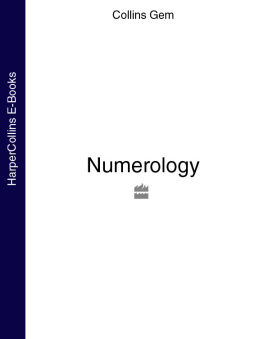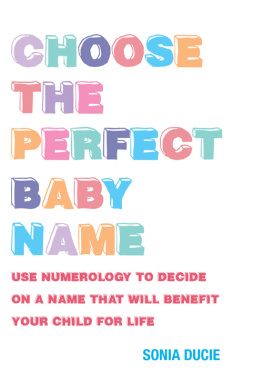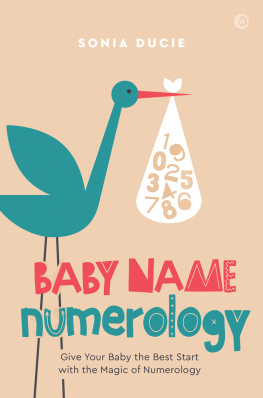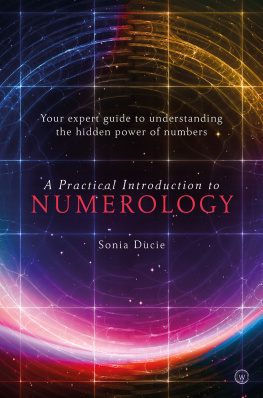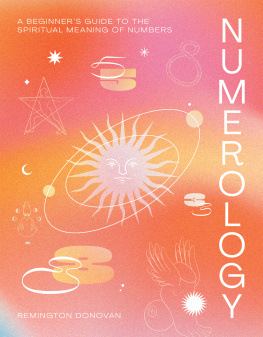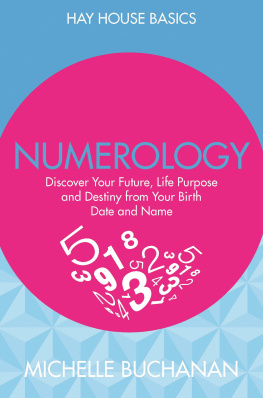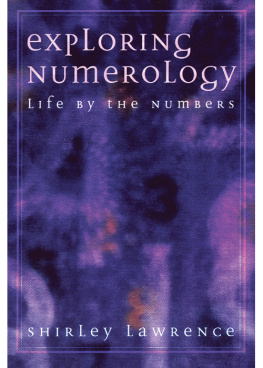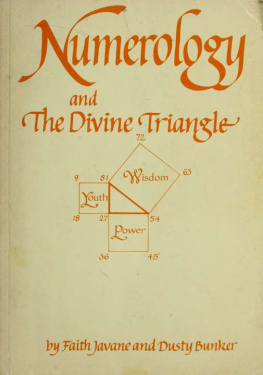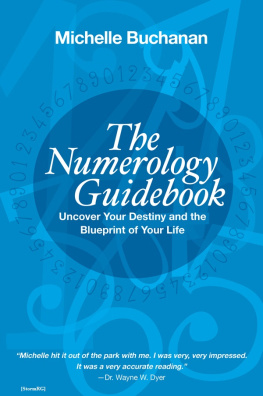Sonia Ducie - Numerology
Here you can read online Sonia Ducie - Numerology full text of the book (entire story) in english for free. Download pdf and epub, get meaning, cover and reviews about this ebook. year: 2002, publisher: HarperCollins (UK), genre: Religion. Description of the work, (preface) as well as reviews are available. Best literature library LitArk.com created for fans of good reading and offers a wide selection of genres:
Romance novel
Science fiction
Adventure
Detective
Science
History
Home and family
Prose
Art
Politics
Computer
Non-fiction
Religion
Business
Children
Humor
Choose a favorite category and find really read worthwhile books. Enjoy immersion in the world of imagination, feel the emotions of the characters or learn something new for yourself, make an fascinating discovery.
- Book:Numerology
- Author:
- Publisher:HarperCollins (UK)
- Genre:
- Year:2002
- Rating:3 / 5
- Favourites:Add to favourites
- Your mark:
- 60
- 1
- 2
- 3
- 4
- 5
Numerology: summary, description and annotation
We offer to read an annotation, description, summary or preface (depends on what the author of the book "Numerology" wrote himself). If you haven't found the necessary information about the book — write in the comments, we will try to find it.
Numerology — read online for free the complete book (whole text) full work
Below is the text of the book, divided by pages. System saving the place of the last page read, allows you to conveniently read the book "Numerology" online for free, without having to search again every time where you left off. Put a bookmark, and you can go to the page where you finished reading at any time.
Font size:
Interval:
Bookmark:
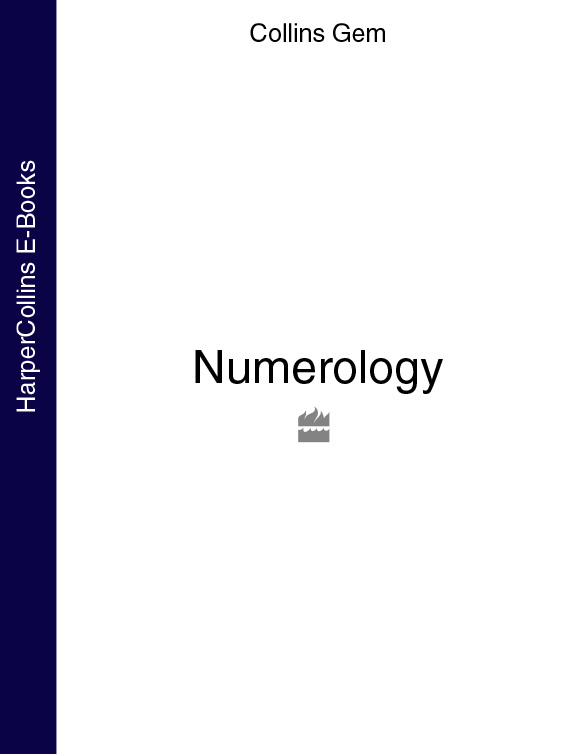
Numbers are central to life, whether they are used in science, with its formulae; history, with its dates; geometry, with its structured use of lines and shapes; music, with its notes each worth a different number of beats; or economics, with its currencies and models. Alternative disciplines like astrology, tarot and runes also use numbers.
Numerology is practised by people from all cultures who want to gain a clearer understanding of who they are, how they work, and how the world in which they live operates. Numbers have always been consulted by those in search of spirituality. Equally, those needing information about a business, a family member, the spelling of a childs name or a wedding date have made choices by applying numerology to their situation.
Working on personal numerology charts with friends is an entertaining pursuit. Even the most sceptical of people are often pleasantly surprised and impressed by the results.

People are drawn to numerology because its simple to use. This book shows how to apply numerology to different areas of life: relationships, health, professions and leisure, while the Origins and Philosophy section shows how different cultures have used numbers to guide them through life.
Numerology is a practical and powerful tool that enables people to understand more about their mind, their body and their spirit. It holds that the day of our birth is no coincidence but is the result of a particular set of circumstances. These include that the parents are ready to have that child and that the babys soul is ready to be reincarnated. Clearly this works on an individual level, but numbers are also relevant to the world as a whole.
Numerology is an intriguing science, a revealing philosophy and a fascinating psychology based on the numbers 1 to 9. Each number (or cycle) has a rhythm to which all people respond. The pattern of this rhythm depends on the numbers in each persons special, unique blueprint, taken from their date of birth and names. Letters from our names are translated into numbers using the alphabet, e.g. A = 1, B = 2 (see Alphabet Chart on p. 25). Personality traits, gifts accumulated from the past and genetic make-up are all contained within this blueprint.
The world also has a collective blueprint which is influenced by the general date.
For example, 30 June 2025:
Step 1:3 + 0 (day) + 6 (month) + 2 + 0 + 2 + 5 (year) = 18
Step 2: 1 + 8 (the figures in the total above) = 9
This means that the characteristics of the number 9 will be significant on that day. The influence of the number 9 will be felt in all spheres, including the economic climate and the politics of the day.
Also on a collective level, the characteristics of the number contained within a year can guide us. For example, the number to which the year 2000 reduced (a 2) highlighted our need for co-operation and sharing.
Life is based upon repeating number cycles for example, solar cycles, yearly cycles, moon cycles, seasonal cycles and everything on Earth is governed by the cycle of transformation called life and death. According to the practice of numerology, numbers constantly repeat themselves in order that individuals can learn to take the wisdom from the experiences numbers offer them. With that wisdom, individuals can free themselves to live life more fully.

Cycles are extremely useful; they help people to see where they have been, where they are now and where they might be in the future. Number cycles offer many opportunities; it is up to the individual to make the most of them.
Sometimes cycles make people feel as though they are in a rut and that, week after week, nothing changes. Like eating breakfast, lunch and dinner at the same time every day, cycles can be uninspiring if people simply go through the motions. At these times people may feel like slaves to life. But numerology can help to maximise the potential of each day.
Politically, it may be that two governments are finding it challenging to reach an agreement about an environmental issue. By looking at the current date and numerological details of the people involved, common issues may emerge that shed light on how the situation can be resolved.
All numbers are significant, and numerology demonstrates that it is vital to observe and understand more about the numbers influencing different areas of our lives. The number of a property will influence the experience of all those living or working within it; the telephone number of a business will produce a vibration which will attract specific situations; and the number of a hospital, theatre, and so on, will bring key strengths and challenges within its potential. The start-date of a new job, the first date within a relationship, the date to embark on a new exercise regime all give us crucial clues as to their potential outcome.
Numerology can help to develop intuition. When numbers are read, information is gathered from the subconscious. In this way, new information is obtained. When negative situations occur, for example when you lose your temper with a friend, numerology can help to turn them into positive experiences via this simple process of awareness.
Any situation in life adheres to the following number cycles:
1 to 3 creative activity; basic experiences
4 to 6 middle period; building
7 to 9 transformational period; spiritual alignment
Most western numerologists trace their methods of practice back to Pythagoras, the Greek philosopher who developed his own Pythagorean system of numerology in the 6thC BC.
His system was based on the numbers 1 to 9, and he called the number 10 a special number, because it contains all the other numbers, 1 to 9, within its vibration. The vibration of a number is all the concepts that are related to it, whether they be negative or positive.
Pythagoras was a great teacher who was able to link together the inner world of consciousness and the outer world of form through the interpretation of the numbers 1 to 9. He founded the ancient School of Mysteries, where he taught students to develop their intuition and their minds by practising numerology; he was also a brilliant mathematician.
He used the wisdom of numbers to awaken people to a deeper awareness of themselves, and of others. This process made him what is known as an initiate. Some people believe that he visited Egypt (among other countries), a land which holds the incredible mystery of the pyramids.
However, numerology has been used since the beginning of time. Evidence of numerology exists within every major culture around the world, but the early Chinese, Hindu and Tibetan peoples were probably among the first to use it. Each culture has its own system, but whichever method is used, core similarities emerge. There is one line of basic truth that is recognised by all systems, and that is the focus of this book.
Numerological systems have been found all over the world. These are some of those systems.

Divination or prediction is one use for numerology. It is based on a combination of using the numbers 1 to 9 and of signs from nature. Where forces outside these two come into play numerology may seem to fail, but as a rule divination is accurate when using numerology.
Font size:
Interval:
Bookmark:
Similar books «Numerology»
Look at similar books to Numerology. We have selected literature similar in name and meaning in the hope of providing readers with more options to find new, interesting, not yet read works.
Discussion, reviews of the book Numerology and just readers' own opinions. Leave your comments, write what you think about the work, its meaning or the main characters. Specify what exactly you liked and what you didn't like, and why you think so.

